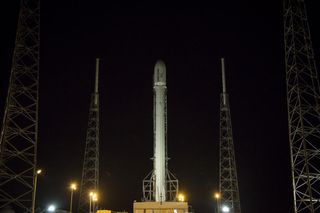
SpaceX has delayed its next launch again, this time to early July.
The private spaceflight firm was originally scheduled to loft six spacecraft for the satellite-communications provider Orbcomm on Friday (June 20) from Florida's Cape Canaveral Air Force Station, but that attempt was scrubbed after engineers detected an unexpected pressure drop in SpaceX's Falcon 9 rocket.
Bad weather nixed a chance on Saturday (June 21), and Sunday's (June 22) attempt was initially pushed to Tuesday (June 24) to investigate an issue that came up during pre-flight checks. But SpaceX representatives said today (June 23) that they need more time to deal with the possible issue, which they didn't describe in detail.
"SpaceX will stand down Tuesday while our engineering teams evaluate further, which will also allow the Range [Cape Canaveral] to move forward with previously scheduled maintenance," SpaceX and Orbcomm representatives said in a mission update today. "We are currently targeting the first week of July and will work with the Range to confirm the next available launch opportunities."
The launch will loft the first six members of the OG2 (short for "Orbcomm Generation 2") satellite constellation. SpaceX will launch a total of 17 OG2 craft this year.
During the OG2 launch, SpaceX will also attempt to bring the Falcon 9's first stage back to Earth in a soft ocean splashdown. The company managed to do this in April during the launch of SpaceX's robotic Dragon cargo craft to the International Space Station for NASA, though rough seas destroyed the rocket stage before recovery boats could get to it.
Such efforts are part of SpaceX's plan to develop a fully and rapidly reusable launch system. Reusable rockets could slash the cost of spaceflight by a factor of 100, opening up the heavens to manned exploration, SpaceX founder and CEO Elon Musk has said.
Get the Space.com Newsletter
Breaking space news, the latest updates on rocket launches, skywatching events and more!
Such ambitious goals are central to the mission of SpaceX, which Musk said he established primarily to help make humanity a multiplanet species.
Follow Mike Wall on Twitter @michaeldwall and Google+. Follow us @Spacedotcom, Facebook or Google+. Originally published on Space.com.
Join our Space Forums to keep talking space on the latest missions, night sky and more! And if you have a news tip, correction or comment, let us know at: community@space.com.

Michael Wall is a Senior Space Writer with Space.com and joined the team in 2010. He primarily covers exoplanets, spaceflight and military space, but has been known to dabble in the space art beat. His book about the search for alien life, "Out There," was published on Nov. 13, 2018. Before becoming a science writer, Michael worked as a herpetologist and wildlife biologist. He has a Ph.D. in evolutionary biology from the University of Sydney, Australia, a bachelor's degree from the University of Arizona, and a graduate certificate in science writing from the University of California, Santa Cruz. To find out what his latest project is, you can follow Michael on Twitter.
